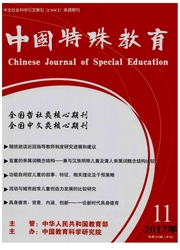

 中文摘要:
中文摘要:
采用根据班杜拉(1996)改编的问卷测查了832名普通中学生和职校生的道德推脱水平,并探讨了其道德推脱与家庭教养方式的关系。结果显示,在遇到道德相关问题时青少年倾向于不认可进行道德推脱,但随年龄增长其道德推脱水平呈上升趋势(除在初二和初三之间有所下降),尤其在初一和初二、高二、高三之间差异显著;女生的道德推脱水平显著低于男生;尽管学校类型的主效应不显著,但普通高一男生的道德推脱水平显著低于同龄的职校一年级学生,在进入高二、高三后道德推脱水平明显向职校生趋同;青少年的道德推脱水平与其家庭教养方式显著有关,放任型的教养方式下其道德推脱水平最高,而权威型的教养方式下其道德推脱水平最低。这些结果揭示出当前青少年道德推脱的发展现状,以及不同的学校教育和家庭教养在青少年道德推脱发展中的作用。
 英文摘要:
英文摘要:
This article, using the revised questionnaire based on the research by Bandura (1996) to test 832 secondary school and vocational school students, aims to explore the relationship between their moral disengagement and parenting styles. The results show the following: the students tend to disagree with moral disengagement when involved in moral issues, but their moral disengagement grows with age (except for a decline between grades 8 and 9), and shows a significant difference between grades 7 and 8, 11, 12; the girls show a significantly lower level of moral disengagement than the boys; in spite of the insignificant main effect of the school types, the boys in grade 10 show a significantly lower level of moral disengagement than their peers in vocational schools, but the boys in grades 11 and 12 tend to show their moral disengagement significantly similar to that of their peers in vocational schools; the students' moral disengagement is found to be significantly correlated with their parenting styles; specifically, those raised with the laissez-faire parenting style and the authoritative parenting style display the highest and lowest level of moral disengagement, respectively. Thesc-results reveal the current developments of adolescents' moral disengagement and the roles of different types of school education and parenting styles in the development of adolescents' moral disengagement.
 同期刊论文项目
同期刊论文项目
 同项目期刊论文
同项目期刊论文
 期刊信息
期刊信息
